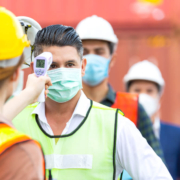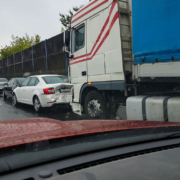COVID-19 – Related Changes in Trucking Regulations Could Result in More Truck Accidents
The coronavirus has caused numerous businesses to close, but in industries that are considered “essential”, demand has skyrocketed. This is particularly true with groceries (toilet paper and hand sanitizer in particular), medical supplies, the raw materials needed to manufacture these supplies, and many others. The need to transport essential goods throughout the country has also placed a major demand on the nation’s truck drivers.
With the increased need for goods and materials, truckers are under immense pressure to deliver their loads on time. The Federal overnment has responded by temporarily easing many of the long-standing trucking regulations that are designed to make the industry safer.
HeGre are some of the recent changes that have happened:
Hours of Service Regulations Lifted for Some Truckers
Since the 1930s, Hours of Service regulations have been in place to protect American truck drivers from driving too long without a break. In an unprecedented move that has never been done in the 80+ years since these regulations were enacted, the Federal Motor Carrier Safety Association (FMCSA) eliminated many of these protections for truckers that transport essential goods.
Normally, truckers are only allowed to drive for 11 hours within a 14-hour period before they must take 10 hours off duty. They are also prohibited from working more than 70 hours in an eight-day period. Now, truckers that bring essential goods and supplies can exceed 11 hours of consecutive driving and they can exceed 70 hours of work over eight days, although they are still required to take 10 hours off after delivering their loads.
Commercial Vehicle Safety Alliance International Road Check Postponed
The Commercial Vehicle Safety Alliance (CVSA) normally conducts a 3-day blitz inspection of commercial trucks in the US and Canada each year. Tens of thousands of vehicles are usually checked to uncover safety problems with the vehicles and issues with drivers. This year, the CVSA postponed their international road check, which was scheduled for May 5-7, until further notice.
Truck Driver Trainees Can Operate without a CDL
In an effort to prevent a shortage of truckers and keep the supply chains moving, the government is allowing new truck drivers to operate a vehicle without a commercial driver’s license (CDL). There are a couple requirements that must be met, however. The driver in training must have already passed their CDL driving test, and there must also be a CDL-holding driver in the truck with them. This still puts a lot of new and inexperienced truck drivers on the roadways during this time.
The Dangers of Truck Accidents During COVID-19
The government lifting regulations on the trucking industry may have been done with good intentions (i.e., to keep our supply chain going), but it has created a more dangerous situation for motorists. Even during normal times, truckers are under great pressure from trucking companies that impose unrealistic deadlines. But at least these drivers had Hours of Service regulations in place to protect them. With these regulations temporarily lifted for some drivers, there is very little to stop companies from forcing their employees to work for far longer than it is safe to do.
When a truck driver is on the road for too long, there is an increased risk of getting tired or sleepy behind the wheel. To help cope with the situation, some drivers turn to alcohol or other substances to take the edge off. But this only makes the situation worse, because we all know that chemical impairment generally results in the reduced ability to focus and poorer driving decisions.
Another potential problem that is caused by the rush to deliver goods and supplies is speeding and aggressive/reckless driving. Knowing that the government wants truckers to do anything they can to keep our supply chain moving, drivers are more likely to feel justified in exceeding the speed limit and cutting whatever other corners they can. Although this behavior may not be explicitly encouraged, the implication is that it is acceptable because of the extraordinary situation we are dealing with.
All of these factors have heightened the risk of trucking accidents – this is one of the countless unintended consequences of our response to COVID-19. And sadly, these accidents often result in severe and catastrophic injuries and fatalities. We hope that as our country emerges from this pandemic, the trucking industry regulations that have been loosened will be put back into place. If this does not happen, the roadways will be less safe going forward.
Injured in a Commercial Truck Accident? Contact Caroselli, Beachler & Coleman for Assistance
If you or someone close to you suffered injury in a trucking accident was caused by another party, you deserve to be fully compensated. Truck accident cases are typically very complicated, however, and there are numerous potential contributing factors and several parties that could be responsible. For this reason, it is very important to work with an attorney who has extensive experience with these types of cases.
At Caroselli, Beachler & Coleman, we have successfully represented countless individuals who have been injured in truck accidents, and we are not intimidated by large trucking companies and their vast resources. For a free consultation with one of our attorneys, message us online or call us today at 412-391-9860 or toll-free at 866-466-5789. We look forward to serving you!












